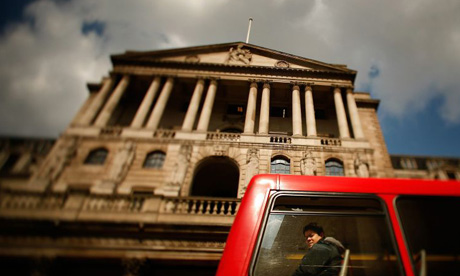Quantitative easing simply hasn't worked, as shown by the fall in lending. The Bank of England should allocate the money itself

In 2009, the Bank of England explained that QE was aimed at "putting more money into our economy to boost spending". Photograph: Peter Macdiarmid/Getty Images
As the Bank of England today decides to introduce a further £50bn into its programme of quantitative easing (QE), it's hard to see why it should be any more successful than the eye-watering £275bn it has already created, which has failed to reach small businesses or create jobs. Yet things could have been very different.
In 2009, the Bank of England explained that QE aims at "putting more money into our economy to boost spending", while relying on the banking system to put the money to work. It said: "Banks end up with more reserves as well as the money deposited with them. Increased reserves mean banks can increase their lending to households and businesses, making it easier to finance spending."
But banks are not increasing their lending. So-called M4 Lending (the Bank's broadest measure of lending to the private sector) contracted by between 3% and 4% on a year-on-year basis in the last quarter of 2011 – the worst performance on record. Bank lending to small- and medium-sized enterprises has contracted most, and the economy is moving into a double-dip. Neither QE nor Project Merlin have been successful.
There is a reason for the otherwise puzzling central bank focus on handing the new QE money to dysfunctional banks: central banks only create 3% of the money supply. Normally, 97% is created by banks through their extension of bank credit. If you wonder how this works: banks simply pretend that borrowers have deposited the money that they lend them, and thus create it out of nothing when they credit their deposit accounts, adding to the money supply. The central banks' focus on entrusting banks to expand the money supply is standard practice. But it hardly makes sense at a time when the very problem is stagnating bank credit. And longer term, we need to challenge the virtual monopoly we have allowed the private sector banks to exercise over the creation of credit.Measures to increase bank credit need to be stepped up. But in the meantime, the banking system needs to be circumvented. The Bank has a long history of lending directly to the economy, not just to banks or the government. It needs to expand the range of assets and investments it undertakes. For example, it could purchase solar panel installations for the nation, with newly created money. This would be highly productive, hence not inflationary, creating thousands of jobs, reducing electricity bills, and cutting climate emissions. There are many other options, including funding green R&D, nationwide broadband, Bank of England cycle paths in every city – you name it.
Critics are quick to point out that such proposals are not practical, as the Bank wishes to purchase "neutral" government bonds, and not engage in any form of allocation policy. If deemed necessary, any of the green spending programmes above could be arranged via an entity that conducts the investments and owns the rights, and issues equity that is guaranteed against default by the government (at no cost), and purchased by the Bank. But many such schemes create extra costs and bureaucracies, and often also debt and interest burdens. The beauty of the power to create money is that there need not be any debt and interest involved.
Money creation is a public privilege – so using it to benefit the public and the environment seems only right. There needs to be a debate about how QE money is spent. In our view, it should be injected directly into projects that create hundreds of thousands of jobs, and reduce our climate emissions. As for the argument that central banks should not make allocation decisions – it ignores reality. Throughout their history central banks have always made allocation decisions when they purchased private sector assets. The mainstay has been corporate securities, rediscounted by the central bank, based on a list of favoured firms. Even in its definition of QE, the Bank has included the possibility of buying "high-quality debt from private companies".
Direct green investments by the Bank also ensure that Britain will not breach any European laws that forbid government intervention in the economy: central banks are allowed to conduct their monetary policy without restriction.
http://www.guardian.co.uk/commentisfree/2012/feb/10/qe-banks-green-projects
The Blogger Ref Link http://www.p2pfoundation.net/Transfinancial_Economics
No comments:
Post a Comment